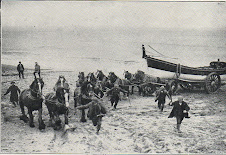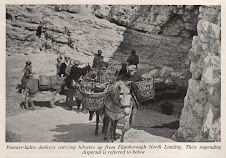The methods employed in preparing the Marine Bill -
Were they well informed, thorough and impartial?
For the time being, horse riding is a perfectly legitimate and well established activity on many English beaches. Despite this, government has drafted the Marine Bill without giving proper consideration to protecting horse riders existing ‘de facto’ or common law access. The evidence for this is contained in the Asken Report[i] commissioned by Defra, (see below).
This omission has not only effectively silenced the voice of horse riders as far protecting their existing access. It also excluded them from participation in the scrutiny of later stages of the Bill, in particular the Select Committee hearings, when no representative of horse riding interests was offered the opportunity to give evidence to the Committee.
“Appraisals for Options to Improve Access to the English Coast – Final Report” Asken Ltd (May 2007).
Government claim to base all new policy and legislation on reliable evidence. Defra and Natural England used the latest England Leisure Visit Survey 2005 statistics to inform their policy making on access provisions to the coast. This Report noted that unlike other leisure pursuits, (for which Defra and Natural England also have responsibility) no official statistics had been gathered to inform government of the extent of horse riding around the English coast. This is at best a negligent omission.
‘Horse riding is not a specified activity in ELVS (England Leisure Visit Survey) and there are no reliable data on the current use of coastal paths and beaches for riding.’*
Para. 3.2.3. Page 16.
The Report acknowledged that equestrians do currently enjoy access to the coast.
‘Horse riding is a well-established customary activity on some beaches. Wide expanses of smooth sandy beaches are favoured as these allow riders to gallop in relative safety.’
Para 12.3.1. Page 161.
The Report alerted government to the possible disadvantage to equestrian access of promoting a statutory access on foot only.
‘It seems, therefore, that there is a risk that improving pedestrian access to the coast, and to beaches in particular, may lead to further restrictions on existing customary horse riding activity’ Page 162.
The Report set out and evaluated the 4 possible Options on how the statutory access law might be implemented. It identified the potentially damaging effect on existing equestrian access of Option 2 (Use of CROW Act s 3.), affecting a staggering 438,000 hectares and Option 4 (Providing an unmapped coastal corridor), capable of affecting 2,300 kilometers of linear access.
Options 2 and 4 have subsequently been adopted by government and inserted into the Bill.
‘Overall, it is concluded that options that affect beaches (i.e. Options 2 and 4) could adversely affect horse riding activity at a small number of beaches, resulting in restrictions to current usage’. Page 162.
As a way of limiting the potential damage to equestrian access, the Report made the recommendation that horse riders could be granted the same statutory right to the foreshores and beaches as walkers, (as is already the case in Scotland). That suggestion has been ignored.
‘However, the opportunity could be taken to extend access rights for horses to foreshores and beaches, thereby making a wider range of such areas available for horse riding.’ Page 162.
In the light of Natural England’s apparent indifference to horse riders as a legitimate user group, their reliance on statistical evidence which is not fit for purpose, and their failure to adopt the recommendations of their own advisors; it is difficult to not to criticize.
* Reliable statistics on horse riding would also have demonstrated that the majority of leisure riders visiting English beaches are women and girls. This raises an additional question. Can Defra and Natural England sustain their claim that the provisions contained in the Draft Marine Bill have no gender implications?
[i] Appraisal of Options to Improve Access
to the English Coast. 2007.
http://www.defra.gov.uk/wildlife-countryside/pdf/access/ca-asken.pdf
skip to main |
skip to sidebar


Bringing in the Lifeboat

Statutory Access to the Foreshore...
News
Traditional Access
Donkey panniers Flamborough North Landing 1952

Access in Scotland
Sharp Practice
Legislation ignores us once again....
A flawed consultation…..
Environmental concerns.....
No thank you Natural England…..
Over the Stable Door
About Me
Blog Archive
-
▼
2009
(16)
- ▼ 01/04 - 01/11 (4)
- ► 01/11 - 01/18 (1)
- ► 03/15 - 03/22 (1)
- ► 03/22 - 03/29 (2)
- ► 03/29 - 04/05 (1)
- ► 06/14 - 06/21 (1)
- ► 06/21 - 06/28 (4)
- ► 07/05 - 07/12 (1)
- ► 11/08 - 11/15 (1)